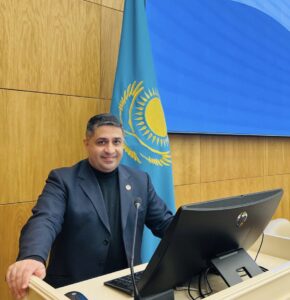ASTANA – Armenia and Kazakhstan are ready to deepen bilateral relations, said Gevorg Melikyan, founder of the Armenian Institute for Resilience & Statecraft, in a recent interview with The Astana Times. Melikyan emphasized the growing potential for deeper cooperation between the two nations across various sectors, highlighting the importance of these evolving ties in the current geopolitical landscape.
Kazakh-Armenian relations

Gevorg Melikyan visited Kazakhstan as part of foreign media delegation during the country’s referendum on the construction of a nuclear power plant. Photo provided by the author.
At the invitation of Kazakh President Kassym-Jomart Tokayev, the President of Armenia, Vahagn Khachaturyan, will pay an official visit to Kazakhstan on Oct. 15, as announced by Akorda press service.
The two leaders will discuss the prospects of further strengthening the Kazakh-Armenian cooperation in political, trade-economic and cultural-humanitarian spheres, as well as exchange views on regional and international agenda issues.
“In general, the dynamic of relations is very positive now. There were some advances since the Soviet times, but there was no special emphasis on these relations, except for within the integration platforms that were initially built after the collapse of the Soviet Union, like the CSTO [the Collective Security Treaty Organization], the CIS, and then the Eurasian Economic Union,” said Melikyan.
“Now, in my opinion, the moment has come when both Armenia and Kazakhstan want to build more direct bilateral relations, regardless of these platforms, which, of course, are important, but since there are more countries in these organizations, it is not always possible to bet on bilateral relations,” he added.
According to Melikyan, the proactive efforts of ambassadors from both countries have the potential to enhance cooperation in sectors such as trade, education, and tourism.
Kazakhstan signed 10 documents with Armenia on trade and economic cooperation, migration, aviation industry, tourism, culture and sports during Tokayev’s visit to Yerevan in April. The President also stated that Kazakhstan is ready to increase exports to Armenia to $350 million.
Negotiations on peace in the South Caucasus
Peaceful regional integration is essential to create and sustain flourishing transit routes and supply chains that connect Central Asia through the North Caucasus to Europe.
“Here, of course, apart from logistical issues, there is also the issue of security of the South Caucasus region. From this perspective, achieving lasting peace in the South Caucasus region is crucial for all these projects to be realized,” said Melikyan.
During Tokayev’s April visit to Armenia, he expressed his willingness to provide a platform for negotiations, encouraging Baku and Yerevan to take steps towards peace.
“In this context, there was an initiative on the part of the President of Kazakhstan to invite the foreign ministers of Armenia and Azerbaijan to Almaty, where the famous Almaty agreement was signed back in 1991 [Almaty declaration on the formation of the Commonwealth of Independent States]. It was variously interpreted as the end of the Soviet Union or the beginning of a new CIS relationship when all former countries of the Soviet Union recognized each other’s territorial integrity. But much has changed since then,” said Melikyan.
The pathway to a peace deal in the South Caucasus has been long and full of distress on both sides. Finding greater common ground might require more time and space, according to him.
“After all, this conflict is over 30 years old. If it was easy to resolve and it only had been a platform issue, it would have been solved. But nevertheless any new platform or any new initiative, when both sides are particularly ready, of course, brings them closer together in some way,” said Melikyan.
Following the talks held in Almaty in May, the Foreign Minister of Azerbaijan Jeyhun Bayramov and Foreign Minister of Armenia Ararat Mirzoyan expressed appreciation to the Kazakh side for providing the platform for the negotiations.
Creating a turnaround in the South Caucasian regional dynamics is essential for developing stable economic ties.
“This is an important issue for Kazakhstan too, I believe, because Kazakhstan needs a stable South Caucasus. We all need a stable South Caucasus, but especially on the topic of logistics, economic projects, infrastructure projects, it is necessary to have a connection between Central Asia and the South Caucasus,” he said.
During a phone conversation with the President of Azerbaijan, Ilham Aliyev, in September, Tokayev reaffirmed the readiness of the Kazakh side to continue providing Almaty as a venue for peace negotiations between Azerbaijan and Armenia.
